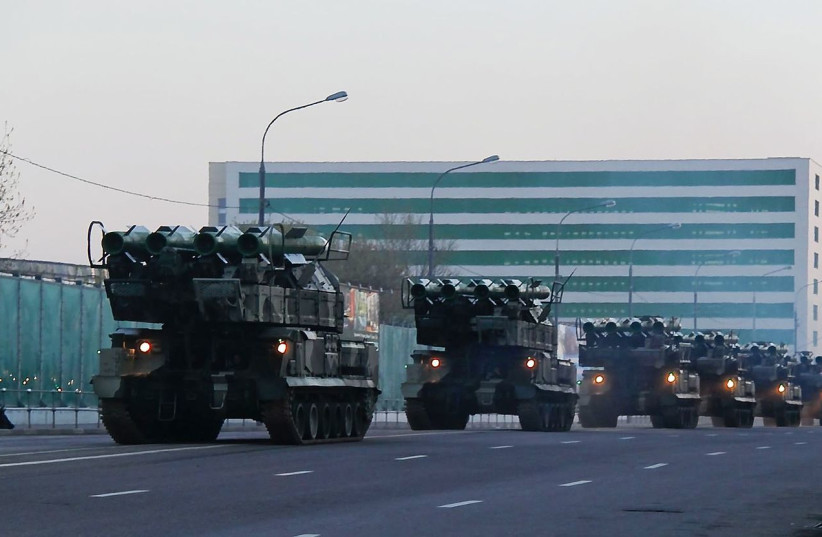Russia is attempting to learn from its early war supply and logistics issues as it prepares to launch a renewed offensive in Ukraine's Donbas region, but is still grappling with the problem due to organizational and sanctions-related complications, American and Ukrainian officials said on Monday.
<br>Learning from logistical mistakes
"It appears as if they are trying to learn from those [logistics] mistakes," said Defense Department Press Secretary John Kirby in a Monday briefing. "It remains to be seen whether they've actually fixed their problems. We still assess that on many levels in many ways, they still haven't figured out logistics and sustainment. And they still have command and control problems."
"In order to improve the logistics system, the Russian occupiers are deploying logistics centers and creating field bases for repairing and renewing damaged equipment," The Ukrainian military noted in a Tuesday morning operational update.
Kirby said that the Pentagon's assessment that the Russians were still preparing for a Donbas offensive was in part due to information that they were attempting to rectify these issues as they transferred artillery, helicopters, and command and support teams to the region.
"These appear to be chronic difficulties that the Russian military has had in terms of logistics and sustainment, command and control, unit cohesion, operational maneuver, integration of air to ground. All problems that they still suffer from. So, it remains to be seen whether they have, quote, 'fixed these problems,' and are now ready to execute in a more efficient way in the Donbas."

<br>Supply problems continue<br><br>
Russia has also been attempting to solve the supply problem of materials and components that exacerbates logistical issues.
"They're working through their own supply efforts — and I should say the replenishment efforts with their own defense contracting process," said a US Defense Department Senior official in a Monday briefing. "They have concerns about how fast and how much they can ramp up their own domestic production of defense articles and that the sanctions are having an effect on their ability to do that."
"There has been an effect on [Russian President Vladimir] Putin's ability to restock and resupply particularly in the realm of components to some of his systems and his precision-guided munitions," the senior official said. "They've already faced an issue in terms of replenishing their inventories because of components to some of those systems, and that's already had a practical effect on Putin."
On Monday night, in response to intensifying missile strikes, Ukrainian President Volodymyr Zelensky noted the chink in Russia's strategy due to sanctions-induced supply issues.
"Russia should have realized that it will be extremely difficult for her to restore the missile stockpile in the face of even existing sanctions," said Zelensky. "Without imports, they can't even do that. And when all the loopholes used to circumvent sanctions are closed, and when even tougher sanctions are imposed, restoring Russia's missile capabilities will be unrealistic. That is, Russian missile strikes lead to only one thing: Missile self-demilitarization of the Russian Federation."
<br><br>Past supply and logistics failures
Russian surface-to-air missiles have reportedly already begun to feel the pinch caused by shortages — On Sunday the Ukrainian Intelligence Directorate (GUR) claimed that a SAM factory had shut down, as according to workers " almost nothing Russian" was used in vital production steps requiring advanced electronic components.
Former western suppliers like Germany are sanctioning Russia, and no longer selling optics, electronics and materials to the eastern state.
"It is obvious that the Russian military-industrial complex remains dependent on imported high technologies," wrote GUR at the time "Without the supply of which Russia is unable to continue production of modern weapons."
The Zircon hypersonic cruise missile, was also announced to have had its production delayed on March 20, but this was attributed to a backlog of production demands.
"A similar process is taking place with other Russian weapons. Producing new artillery, aircraft, new helicopters, and cruisers under sanctions will be a daunting task for Russia," Zelensky noted.
GUR has also claimed that the production of T-72 main battle tanks has been crippled, and production of advanced T-90s and T-14 Armatas has completely halted. This was also credited to lack of key foreign components, as well as the rising cost of materials.
The intelligence agency also claimed earlier in April that some Russian shipyards are unable to construct warships or conduct maintenance on vessels.
A Vladivostok shipyard was allegedly unable to meet 25 billion rubles worth of government orders to build two tankers, two missile boasts, and to maintain and repair other vessels, GUR claimed.
Lack of foreign components was allegedly preventing the construction of warships parts and naval warfare systems, such as steering columns, navigations systems, radio stations, and charges for naval artillery shells.
Russia was alleged by Ukrainian intelligence to be trying to circumvent production issues by smuggling components through Georgia and Asia, restoring old and mothballed vehicles, repairing captured Ukrainian gear, and in one case switching production to older weapon platforms. Corruption has reportedly hindered some restoration attempts.
The Russian military has suffered logistical issues throughout the war, according to Western and Ukrainian intelligence estimates. There have been many instances reported in which vehicles have been abandoned due to lack of fuel, and others in which poor upkeep of vehicles has led them to break down. Some troops have reportedly been sent into battle with old food rations, subpar equipment, and limited ammunition.
Aaron Reich contributed to this report.
